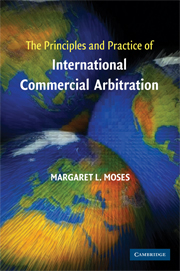Book contents
- Frontmatter
- Contents
- Foreword
- Preface
- 1 Introduction to International Commercial Arbitration
- 2 The Arbitration Agreement
- 3 Drafting the Arbitration Agreement
- 4 Applicable Laws and Rules
- 5 Judicial Assistance for Arbitration
- 6 The Tribunal
- 7 The Arbitral Proceedings
- 8 The Award
- 9 Attempts to Set Aside an Award
- 10 Enforcement of the Award
- 11 Investment Arbitration
- Appendices
- Index
5 - Judicial Assistance for Arbitration
- Frontmatter
- Contents
- Foreword
- Preface
- 1 Introduction to International Commercial Arbitration
- 2 The Arbitration Agreement
- 3 Drafting the Arbitration Agreement
- 4 Applicable Laws and Rules
- 5 Judicial Assistance for Arbitration
- 6 The Tribunal
- 7 The Arbitral Proceedings
- 8 The Award
- 9 Attempts to Set Aside an Award
- 10 Enforcement of the Award
- 11 Investment Arbitration
- Appendices
- Index
Summary
In international commercial arbitration, most of the time parties and arbitrators do not want interference from a court. There are, however, times when the support of a court can prove essential. The primary reason is that courts have resources that are lacking to a tribunal – in particular, coercive powers – that is, the ability to make someone do something. Courts can require performance because they have the ability to impose negative consequences if a person does not perform, in the form of fines, incarceration or other penalties. Although tribunals have some ability to impose negative consequences on parties, such as drawing an adverse inference if a party does not produce documents, they have no ability to make a party carry out an order, and no coercive powers that can be applied to persons who are not party to the arbitration.
Courts also have an oversight role. Although arbitration is a private system of justice, organized and regulated by the parties in light of the rules and procedures they have chosen, it is still governed by law, and almost always by the arbitration law (lex arbitri) of the seat of the arbitration. Courts expect to retain a level of control to ensure that the private system of justice meets at least minimum standards of fairness – so that arbitration is not a system that is fraudulent, corrupt, or lacking in essential due process.
- Type
- Chapter
- Information
- Publisher: Cambridge University PressPrint publication year: 2008



